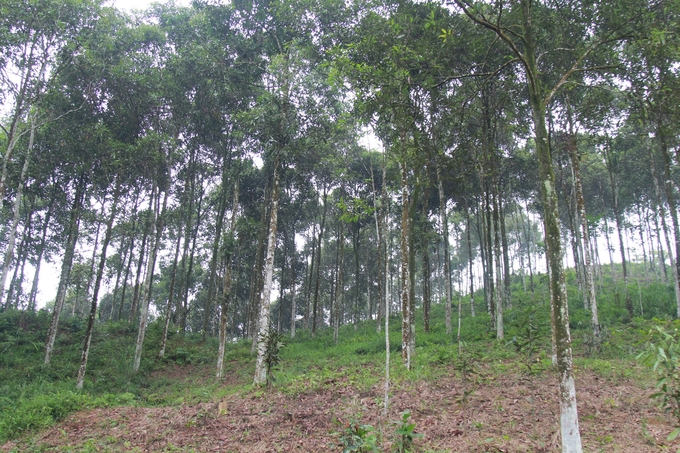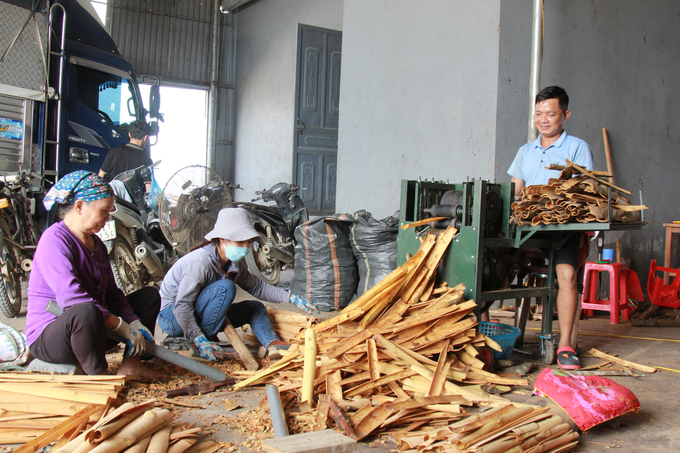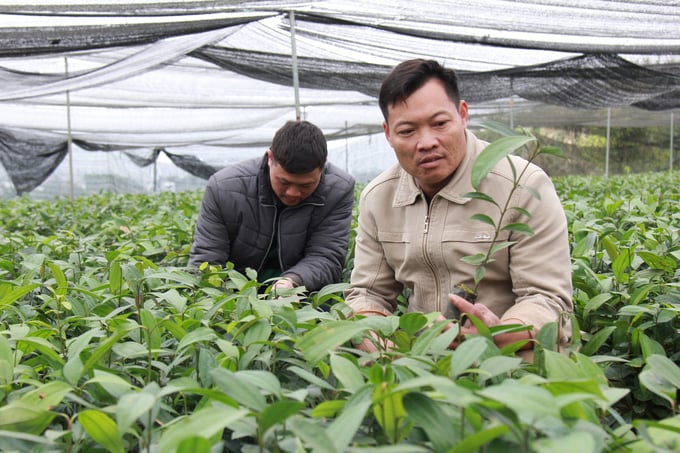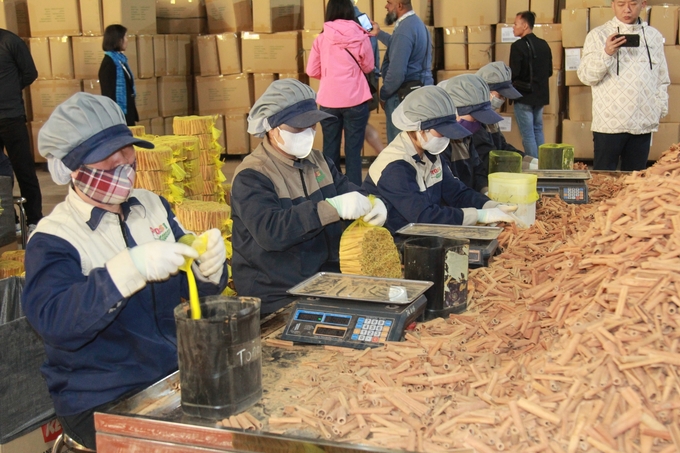June 16, 2025 | 06:15 GMT +7
June 16, 2025 | 06:15 GMT +7
Hotline: 0913.378.918
June 16, 2025 | 06:15 GMT +7
Hotline: 0913.378.918

The cinnamon plantation area in Van Yen currently covers over 57,000 hectares, making it the largest cinnamon-growing region in the country. Photo: Thanh Tien.
In addition to providing environmental and human health benefits and increasing economic value, organic agricultural production provides a sustainable solution that enables Vietnamese agricultural products to be widely exported to significant high-value markets. Van Yen District (Yen Bai Province) has successfully implemented the "four-house" linkage to construct an organic cinnamon raw material area following this trend.
The country's main cinnamon-growing region is Van Yen. The cinnamon in this region is regarded as the "first-class upland precious cinnamon" due to its unique soil conditions and the presence of pure and fresh air. The residents of Van Yen have enjoyed a prosperous existence for centuries as a result of the cinnamon trees that have been passed down through the generations. With an average annual output of approximately 6,000 tons of various dried cinnamon bark varieties, the district's total area of cinnamon is now over 57,000 hectares, generating employment opportunities for thousands of local workers.

Cinnamon is grown in all 25 communes and towns in Van Yen District, generating annual revenues of 600-800 billion VND. Photo: Thanh Tien.
Mr. Pham Trung Kien, Vice Chairman of the Van Yen District People's Committee, stated that the district's residents have long been associated with cinnamon. The customs of the indigenous Red Dao people are inextricably linked to this plant. The cinnamon tree, which is a member of the Lauraceae family and the genus Cinnamomum, is scientifically known as Cinnamomum cassia BL. Essential oil and cinnamon bark are the primary products of the cinnamon tree. These products are extensively employed in the food processing industry, medicine, flavorings, and animal husbandry.
Cinnamon is cultivated in all 25 communes and municipalities within the district. In 2010, Van Yen was granted a geographical indication for the cinnamon region in eight communes on the right bank of the Red River, including Chau Que Ha, Xuan Tam, Phong Du Ha, Phong Du Thuong, Tan Hop, Dai Son, Mo Vang, and Vien Son. The district's cinnamon products generate an annual revenue of 600-800 billion VND, which contributes to the improvement of the people's well-being and happiness in their homeland.
At present, the district boasts an organic cinnamon area that exceeds 11,000 hectares, with the expectation that the total area of organic cinnamon certified by European and US standards will surpass 15,000 hectares by the conclusion of 2024.
Van Yen District has also strongly encouraged individuals to cultivate cinnamon in concentrated areas with high-quality varieties and to expand the product consumption market, in addition to encouraging active investment in the area's expansion and appropriate exploitation. The district places a particular emphasis on the implementation of policies that promote science and technology, the support of production forests, and the organization of training sessions for individuals on the proper technical procedure for planting, caring for, exploiting, and protecting cinnamon.
Van Yen District has also established the Van Yen Cinnamon Production and Business Association and the Cinnamon Essential Oil Processing and Business Association to collaborate on the cultivation, exploitation, processing, and consumption of cinnamon products. The party committees and authorities at all levels in the district have facilitated and encouraged the establishment of businesses, cooperatives, and processing, procuring, and consuming facilities for products made from bark, wood, branches, and leaves.

In Van Yen, many production chains have been established for cinnamon, from cultivation to product consumption. Photo: Thanh Tien.
Consequently, the district is now home to hundreds of facilities that purchase and preliminarily process cinnamon bark. These facilities produce a variety of products, including clip cinnamon, woven cinnamon, split cinnamon, cigar tube cinnamon, chunk cinnamon, cigarette cinnamon, powder cinnamon, and handicraft products.
The district currently boasts 43 OCOP products, including 19 cinnamon products, 18 three-star products, and 1 four-star OCOP product. Additionally, they are in the process of developing a five-star OCOP product from piccolo cinnamon. Furthermore, two OCOP product introduction points in the district presently offer a variety of cinnamon-related products.
The Economic Infrastructure Department of Van Yen District reports that there are currently 212 households and facilities in the district that are involved in the production and trade of cinnamon seedlings. Three cooperatives specialize in the production and trading of cinnamon seedlings, while the remaining cooperatives operate on a domestic scale.
Throughout the year, the activities of purchasing, processing, and ingesting cinnamon products are in full swing. More than 200 facilities purchase and preliminarily process cinnamon bark, while over 21 facilities distill cinnamon essential oil. The district supplies nearly 50 million cinnamon seedlings annually to local and external regions, sells over 6,000 tons of dried cinnamon bark, provides over 65,000 tons of cinnamon branches and leaves for essential oil distillation, and produces over 300 tons of essential oil on this scale. Furthermore, they collect more than 60,000 cubic meters of timber annually. In 2023, the district's total value of cinnamon products surpassed 600 billion VND.

Van Yen District has attracted many large enterprises to invest in modern factories for purchasing and processing cinnamon products for export. Photo: Thanh Tien.
Notably, the district has attracted numerous large enterprises to invest in 12 modern factories to purchase and process high-quality cinnamon products for export. These enterprises include Son Ha Spice Flavourings Co., Ltd., Olam Vietnam, and Prosy Thang Long.
Son Ha Spice Flavourings Co., Ltd. was founded in 1992. For more than three decades, the organization has procured cinnamon raw materials from the provinces of Yen Bai and Lao Cai. The company officially established a branch in Yen Bai in 2015, and in 2018, it continued to expand by investing in infrastructure and constructing a factory in Yen Hop commune, Van Yen district.
Son Ha Spice Flavourings Co., Ltd. is a prominent premium organic spice brand that specializes in the processing and export of pepper, star anise, and cinnamon products. The organization provides cinnamon raw materials and other spices to prominent pharmaceutical, beverage, and decoration manufacturers worldwide, including those in the United States, the European Union, and the Middle East.
Yen Bai is regarded as the cinnamon capital of Vietnam, as it occupies the greatest area in the country, according to Mr. Le Van Long, Project Manager at Son Ha Spice Flavourings Co., Ltd. The central core of Vietnam, Van Yen district, is characterized by the lively exchange of buyers and sellers, which is reminiscent of a "cinnamon market" for the entire country, not just Yen Bai.
Son Ha Spice Flavourings Co., Ltd. has consistently endeavored to acquire prestigious certifications in order to access high-end international markets. The company views these certifications as "passports" that will enable the company to introduce its products to demanding markets. Currently, the company's average production exceeds 2,000 tons of dried cinnamon peel annually, ensuring stable income employment for more than 180 local employees.
Translated by Linh Linh
![Turning wind and rain into action: [4] Bringing climate bulletins to remote and isolated areas](https://t.ex-cdn.com/nongnghiepmoitruong.vn/608w/files/linhnhp/2025/06/14/1152-z6704423696987_15fd32ffc26d590d204d520c9dac6786-nongnghiep-151141.jpg)
(VAN) The Vietnam Agriculture and Nature Newspaper interviewed Mr. Vu Thai Truong, Acting Head of Climate Change and Environment at UNDP Vietnam, to gain deeper insight into how climate bulletins are delivered to farmers.

(VAN) In Tien Giang, a high-tech shrimp farm has developed a distinctive energy-saving farming model that has yielded promising results.
![Turning wind and rain into action: [3] 300.000 farmers benefit from agro-climatic bulletins](https://t.ex-cdn.com/nongnghiepmoitruong.vn/608w/files/news/2025/06/12/e5a48259d6a262fc3bb3-nongnghiep-125122.jpg)
(VAN) The agro-climatic bulletin has become a valuable tool for farmers in the Mekong Delta. After more than five years of implementation, the initiative is gradually being expanded nationwide.
![Turning wind and rain into action: [2] Providing forecasts to the people](https://t.ex-cdn.com/nongnghiepmoitruong.vn/608w/files/news/2025/06/12/e5a48259d6a262fc3bb3-nongnghiep-103927.jpg)
(VAN) In addition to improving the quality of hydrometeorological forecasts, putting forecast bulletins into practical use is crucial for production and disaster prevention.

(VAN) Blue carbon is receiving attention for its rapid absorption capacity and vast potential. It represents a promising nature-based solution to respond to climate change.
/2025/06/11/3507-1-161904_583.jpg)
(VAN) Seagrass beds and coral reefs serve as 'cradles' that nurture life in the ocean depths, creating rich aquatic resources in Vietnamese waters.
![Turning wind and rain into action: [1] Forecasting for farmers](https://t.ex-cdn.com/nongnghiepmoitruong.vn/608w/files/news/2025/06/11/e5a48259d6a262fc3bb3-nongnghiep-111919.jpg)
(VAN) Weather is no longer just a matter of fate. Forecasts have now become an essential companion for farmers in every crop season.